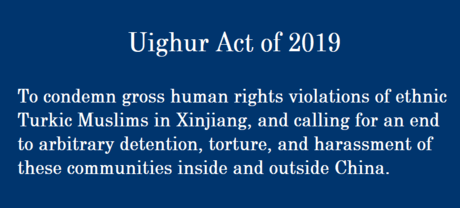China Warns US Over Uighur Bill: Reuters
China warns that a US bill calling for an end to detentions of Uighur Muslims in Xinjiang could disrupt bilateral cooperation including trade talks. China is already sore about US passage of the Hong Kong Human Rights and Democracy Act. The US House of Representatives overwhelmingly approved the Uighur Human Rights Act that includes sanctions for one politburo member. Businesses and investors are keen to see an end to the US-China trade war amid widespread agreement that reports of mass detentions and reeducation camps for ethnic minorities are disturbing. The US president has suggested that a trade deal may have to wait until after the US election in November 2020. Reuters reports that “sources familiar with the talks say the two sides are still wrangling over the details including whether existing U.S. tariffs on Chinese goods will be removed and how much in additional U.S. agricultural products China will buy.” Some analysts expect a trade agreement to arrive in various parts. Meanwhile, another round of US tariffs is scheduled for December 15 and Chinese retaliation could follow. Chinese media also report the nation will “release a so-called unreliable entities list imposing sanctions against those who harm Chinese interests.” The bill continues on to the Senate. – YaleGlobal
China Warns US Over Uighur Bill: Reuters
China bristles over US House of Representatives’ approval of legislation calling for end of mass detentions of Uighurs – and suggests trade talks could suffer
Wednesday, December 4, 2019
Read the article from Reuters about the proposed US Uighur Act of 2019.
Reporting was also provided by Patricia Zengerle and Matt Spetalnick in Washington, Steve Holland and William Schomberg in London, and Huizhong Wu in Beijing.

US findings include:
- China has a history of repressing 13,000,000 Muslims, particularly Uyghurs, in the nominally autonomous Xinjiang region.
- Central and regional Chinese government policies have systematically discriminated against Uyghurs and other Muslims in Xinjiang.
- Increased unrest in the Xinjiang region as a result of the central government’s severe repression is used as an excuse for further disproportionate response.
- China engages in high-tech surveillance across the region, including the arbitrary collection of biodata, facial and voice recognition software and predictive policing databases.
- There are severe restrictions on the freedom of movement across the region.
- Uyghurs are forced to celebrate Chinese cultural traditions, such as Chinese New Year, and unique Uyghur culture is facing eradication due to state control over Uyghur cultural heritage.
- There is ample credible evidence provided by scholars, human rights organizations, journalists, and think tanks substantiating the establishment by Chinese authorities of political reeducation camps.
- Uyghurs and Kazakhs, who have now obtained permanent residence or citizenship in other countries, attest to receiving threats and harassment from Chinese officials.
- Six journalists for Radio Free Asia’s Uyghur service have detailed abuses their family members in Xinjiang have endured in response to their work exposing abusive policies.
- Several US-based companies are conducting business with Xinjiang authorities without sufficient due diligence or safeguards to ensure their business operations do not create or contribute to human rights violations.
- The Government of the People’s Republic of China is increasingly investing in the Belt and Road Initiative across Xinjiang and throughout Central Asia.
- Chinese authorities either flatly denying allegations or insist that the facilities are vocational training centers.
- On September 18, 2018, the Washington Post editorial board wrote, At stake is not just the welfare of the Uighurs, but also whether the technologies of the 21st century will be employed to smother human freedom.
- In December 2018, independent media reports pointed to growing evidence of forced labor in the camps, as well as reports of released individuals being forced to labor in nearby factories for low wages.
- Experts have described the Xinjiang region as a police state to rival North Korea.
(Source: GovTrack and Congress.Gov)
Reuters
© 2019 Reuters. All Rights Reserved.